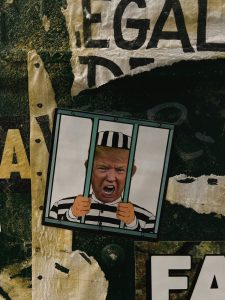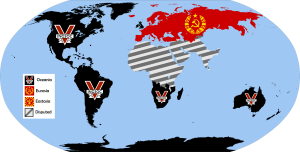by Jeffrey Meyers
“He never worked in the accepted sense of the word. He never read any books or magazines and never felt any need to.” “An utter ignoramus, he was barely literate and did not like to study problems in detail.” “In later years, he laid claim to the irrefutability of his views on all questions. [On some issues] his complete ignorance was obvious.” “The more he revealed his ignorance, the more he insisted that everyone recognize his absolute monopoly as the representative and incarnation of the state.”
“What concerned him most was that government institutions wielding direct and real power were staffed with his own loyalists.” “Outstanding and gifted commanders were replaced by mediocrities who were ready to swear fealty to him.” “Well-educated, high-minded, experienced and honest people were often replaced by less qualified, less strong, less cultured, morally and politically questionable types.” “He did not shrink from any falsehood. He was utterly intolerant of any remark directed toward himself or his protégés; the critic was immediately fired from his job.”
He made incoherent speeches, and “toward the end of his political career his passion for speechifying became a pathological verbosity.” “Under his one-man rule, all procedural conventions were tossed aside, and the whole storehouse of diplomatic discourse was turned upside down.” “If his speech was on foreign affairs, officials responsible for the conduct of foreign policy squirmed in tense anticipation. What thunderbolt was coming next? What damage would it cause?” He wasted precious resources: “Why, for an entire decade, was he able to initiate ridiculous and fanciful projects that were costly to the country without any opposition?”
Erratic and unpredictable, his “impulsiveness and incurable bent for improvisation had tragic results.” “He made spontaneous, contradictory, unwarranted and at times preposterous decisions that he reached by instinct and whim. The country paid dearly—with billions—for this capriciousness.” “It was part of his style to make startlingly quick promises and set astonishing time limits on the sole basis of his intuition.” “His idiotic improvisations and economic recklessness had tragic consequences.”
So, did you get it right?
All my quotations are about Nikita Khrushchev and from a book by Dmitrii Shepilov—a Russian major general in World War II, editor-in-chief of Pravda and director of the Communist Party Bureau of Propaganda. He had close contact with Khrushchev for three decades and recorded his vivid impressions in The Kremlin’s Scholar (2007). A devotee of Stalin, Shepilov loathed Khrushchev, who had a theatrical flair for dramatic gestures—pounding on the U.N. podium with his shoe—akin to our reality-TV star president. His descriptions sound eerily like Trump’s conduct in the White House—the bombast, the lies, the rambling speeches, the fantasy solutions to national problems, the total ignorance of foreign affairs.
Khrushchev took power on the death of Stalin in 1953 and became another absolute ruler. He inherited a totalitarian system that enabled, even expected, him to do whatever he liked. It’s shocking to see how Trump has ruled unopposed by Republican senators in democratic America, in the same way that Khrushchev had ruled totalitarian Russia, and has caused the same kinds of disastrous damage to his country.
Khrushchev was forcibly deposed in 1964. Trump, for the same faults, must be deposed in November 2020.
Jeffrey Meyers, FRSL, has recently published Thomas Mann’s Artist-Heroes (2014), Robert Lowell in Love (2015) and Resurrections: Authors, Heroes—and a Spy (2018).





Be First to Comment